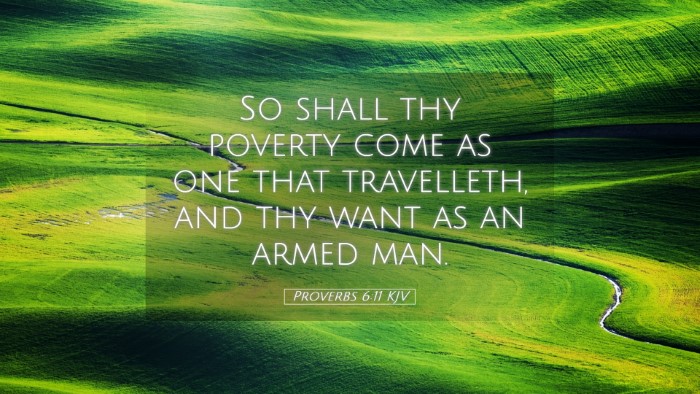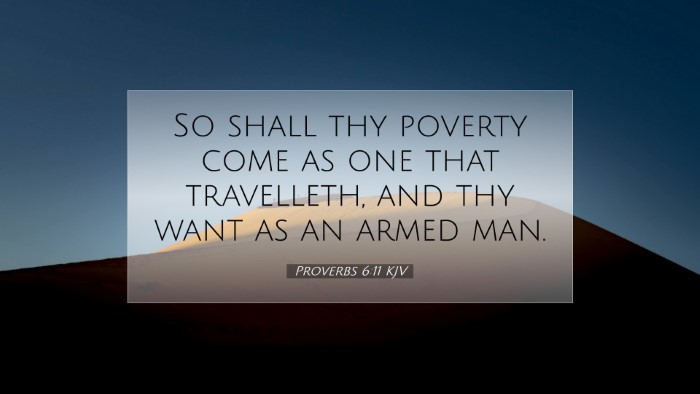Commentary on Proverbs 6:11
Proverbs 6:11 states, "So shall thy poverty come as one that travelleth, and thy want as an armed man." This verse serves as a warning about the consequences of slothfulness and neglecting one's responsibilities. Below, we explore insights from various public domain commentaries to provide a comprehensive understanding.
Contextual Background
This verse is nestled within a passage that exhorts the reader to consider the ant as a model for industriousness (Proverbs 6:6-8). The subsequent warning (Proverbs 6:9-10) addresses the foolishness of sluggards who desire to be inactive. Proverbs 6:11 follows as a definitive conclusion; the lazy will inevitably face dire consequences.
Insights from Matthew Henry
Matthew Henry emphasizes the inevitability of consequences for laziness. He notes:
- Poverty as a Traveler: The imagery of poverty arriving as one that travels indicates how swiftly and unexpectedly poverty can overtake a person who is lazy. It does not announce itself but rather springs upon individuals who fail to act.
- Want as an Armed Man: The phrase likening want to an armed man suggests that need and want can come against a person with force and aggression. This portrays how dire circumstances can confront a sluggard and bring about distress.
Insights from Albert Barnes
Albert Barnes provides additional reflections, particularly on the inevitability of poverty:
- Mechanism of Poverty: Barnes highlights that poverty is not merely a lack of resources but arises from a failure to pursue labor earnestly. It tends to overtake the lazy like an uninvited guest, presenting an ongoing challenge.
- Spiritual Application: He further notes that this verse serves as a warning about the spiritual implications of neglect. Just as physical poverty can ensnare the lazy, spiritual negligence leads to impoverished faith and loss of spiritual vitality.
Insights from Adam Clarke
Adam Clarke elaborates on the metaphorical language used in Proverbs 6:11:
- Imagery of Travel: Clarke points out that the metaphor of poverty as a traveler indicates an unstoppable force. Travelers move from place to place, and similarly, poverty spreads among those who do not take personal responsibility.
- The Armed Man Symbolism: He delves deeper into the notion of want appearing as an armed man, which symbolizes aggression and intimidation. This serves to further instill the fear of such outcomes, urging diligence in all endeavors.
Theological Reflections
This verse invites theological reflection regarding human responsibility and divine providence:
- Work Ethic in Theology: The Bible emphasizes the value of hard work (Proverbs 10:4; Colossians 3:23). This passage affirms that spiritual diligence is intrinsically linked to material provision.
- God’s Providence: While human effort is essential, it operates under the sovereignty of God. Proverbs 6:11 emphasizes that neglecting work can contradict God’s design for provision and blessings.
Applications for Pastors and Theologians
For pastors, students, and theologians, this verse provides rich material for practical teaching:
- Encouragement to Work: Pastors should encourage their congregations to cultivate a strong work ethic and discourage laziness as it leads not only to material poverty but also to spiritual decline.
- Spiritual Vigilance: The verse can be a foundation for sermons that urge believers to remain vigilant spiritually, avoiding both physical and spiritual slothfulness.
- Holistic Prosperity: The challenge extends toward a balanced perspective on prosperity, emphasizing that both physical and spiritual realms require intentional effort.
Conclusion
Proverbs 6:11 serves as a powerful reminder of the repercussions of negligence, urging individuals toward diligence in all aspects of life. From the wise counsel of Henry, Barnes, and Clarke, it becomes evident that the call to action is not merely about avoiding poverty but embracing the richness of a life well lived in accordance with God’s principles. In doing so, believers can find both material and spiritual wealth.


